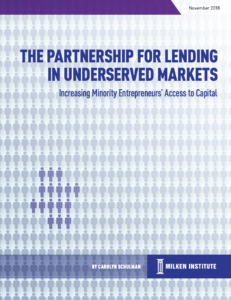 The Partnership for Lending in Underserved Markets: Increasing Minority Entrepreneurs’ Access to Capital
The Partnership for Lending in Underserved Markets: Increasing Minority Entrepreneurs’ Access to Capital
Carolyn Schulman, Milken Institute
First published November 2018
The contribution and importance of small businesses to the nation’s economy is well-researched and understood; for minority-owned small businesses, the impact and significance are even greater. Not only do minority-owned small businesses help drive job creation, raise wages, and elevate better standards of living, they also offer a critical pathway for Black and Hispanic populations to close the racial wealth gap. An increase in entrepreneurship among people of color can create income for both entrepreneurs and the people of color who work at the businesses. Yet, starting a new firm or growing an established business requires capital, and Black and Hispanic businesses have higher barriers to accessing capital.
In 2016, the Milken Institute and the U.S. Small Business Administration (SBA) formed the Partnership for Lending in Underserved Markets (PLUM) to develop actionable solutions to long-standing barriers that constrain minority entrepreneurs from accessing capital to start and grow businesses. The Institute committed to forming local programs in Baltimore and Los Angeles and to undertaking national research and policy efforts. The SBA provided seed funding and on-the-ground support.
The Institute has been documenting preliminary findings and outcomes, as well as publishing public comment letters and other research.1 In the following pages, we summarize research, activities, and outcomes in hopes that local and national leaders can build on the PLUM foundation and continue to advance solutions to increase minority access to capital.
Download Resource